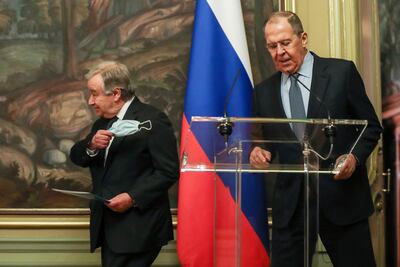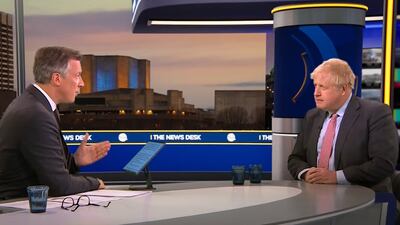Live updates: follow the latest news on Russia-Ukraine
British Prime Minister Boris Johnson dismissed fears that Russian President Vladimir Putin could launch a tactical nuclear strike if his army remains bogged down in Ukraine.
Mr Johnson said the overwhelming support in Russia for the invasion meant Mr Putin had the “political margin for manoeuvre” to withdraw his forces if they fail to break Ukrainian resistance.
Analysts in the UK said the war in Ukraine must lead to changes to global security arrangements that include sending warplanes to Ukraine, while the Nato alliance hopes heavy artillery will frustrate Russian attacks.
Some analysts claimed a frustrated Mr Putin could use low-yield battlefield nuclear weapons if there were more setbacks in Ukraine.
On Tuesday, Russian Foreign Minister Sergey Lavrov said that the threat of nuclear conflict “should not be underestimated”.
He accused Nato allies of “pouring oil on the fire” by providing increasingly powerful weaponry to the Ukrainians and he warned against provoking “world war three”.
However, in an interview with TalkTV, Mr Johnson said the situation was not as perilous as suggested and that the West did not need to make concessions to avoid an escalation of the conflict.
“Given the massive Russian backing for what he is doing, given the apparent obliviousness of the Russian media about what is really happening in Ukraine, the paradox is that Putin has far more political space to back down, to withdraw,” Mr Johnson said.
“There will come a point when you [Mr Putin] say to the Russian people, ‘The military technical operation we launched in Ukraine has been accomplished, it has been technically a success.'
“I think he has far more political space than people worry about. People say we have to make a concession, we have to worry about what Putin might do because of the risk of his defeat.
“I think he has got a lot of space. He has got a lot of room for manoeuvre.”

Mr Johnson said Britain and other “sympathetic” countries would continue to supply more Nato-grade weapons, training and intelligence sharing to Ukraine.
While the prime minister insisted he did not want the crisis to escalate beyond Ukraine’s borders, he indicated he was happy to see the Ukrainians use British-made weaponry against Russia.
“They are being attacked from within Russia territory. They have a right to protect and defend themselves,” he said.
“We cannot accept the idea that this is some sort of stand-off between Russia and the West.
“Putin’s regime is engaged in a diabolical attempt to crush the life out of the Ukrainian state. What we are doing is helping the Ukrainians to protect themselves.”
Foreign Secretary Liz Truss, in a speech scheduled for Wednesday, will say the West must be ready to ensure Russian defeat in Ukraine.
“We must be prepared for the long haul and double down on our support for Ukraine. Heavy weapons, tanks, aeroplanes — digging deep into our inventories, ramping up production. We need to do all of this.”
Armed Forces Minister James Heappey said Britain would providing the Ukrainians with Brimstone ground attack missiles “in the next few weeks”.
“Recently Ukraine has been asking for longer-range missiles, and the government has been exploring if stocks of Brimstone could be released,” he said in the House of Commons.
“This remains very much in line with our principle of evolving our support to Ukraine as the conflict evolves and their capability requirements change.”
He also said that Ukrainian strikes against Russian logistics lines and fuel supplies were legitimate strategies.
Mr Heappey said it was for Ukraine to decide what to target and he accepted that targets in Russia were vulnerable to Ukrainian attack.
“It is entirely legitimate to go after targets in the depth of your opponent's [territory] to disrupt their logistics and supply lines,” he said.




















































